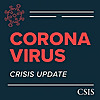
Take as Directed
349 FOLLOWERS
Take as Directed is a series of the CSIS Global Health Policy Center. It highlights important news, events, issues, and perspectives in global health policy, particularly in infectious disease, health security, and maternal, newborn, and child health. This series brings you commentary and perspectives from some of the leading voices in global health.
Take as Directed
1w ago
France’s dynamic Ambassador for Global Health, Anne-Claire Amprou, visited CSIS for an extended conversation on the topline historical challenges that her office addresses: elevating climate’s health impacts, the pandemic treaty negotiations and reform of the IHR, anti-microbial resistance (AMR) in the year of the UN General Assembly High Level Meeting in September, navigating multiple ambitious global health replenishments amid scarcity, investing in workforce training, the WHO academy in Lyons, strengthening the French-US relationship, and France’s special engagement on the humanitarian cris ..read more
Take as Directed
3w ago
The inimitable Jennifer Kates, KFF, joins us to make sense of the multiple, convergent, competitive replenishments of the most significant instruments in global health – the Global Fund, Gavi, the Pandemic Fund, WHO at historic moment of intense geopolitical tensions and big, costly wars, the ascent of climate, fiscal scarcity, many elections in the populist era, and post-pandemic fatigue. The US elections are stirring high anxiety across the globe. Attention is focused on the Project 2025 blueprint for a Trump victory. Where is the hope and optimism? Give a listen ..read more
Take as Directed
1M ago
In the fifth episode of the CommonHealth Live! series, J. Stephen Morrison speaks with Dr. Sandro Galea, Dean and Robert A. Knox Professor, Boston University School of Public Health on the public health workforce pipeline. How to position public health schools and departments within universities to be more powerful, better funded, with better access to senior leadership? What are the concrete changes in the curricula of public health programs and the recruitment of faculty and students that are going to be most essential to meet the demands of the post-Covid era and correct the drift into illi ..read more
Take as Directed
1M ago
Since the start of 2024, several countries in South America have experienced a rapid increase in cases of dengue, a viral disease transmitted by the aedes aegypti mosquito. According to the Pan American Health Organization (PAHO), this year alone at least 18 countries in the Americas have reported cases, with more than 400 deaths. In Peru, at the end of February, the government declared an emergency in 20 districts, setting up makeshift clinics and sending additional financial and human resources to affected areas. Dr. Andrés (Willy) Lescano, who leads the Emerging Infectio ..read more
Take as Directed
1M ago
In the fourth episode of the CommonHealth Live! series, Vanessa Kerry, World Health Organization (WHO) Director General Special Envoy for Climate Change and Health and Austin Demby, Minister of Health and Sanitation for Sierra Leone join Julie Gerberding, CSIS Bipartisan Alliance for Global Health Security Co-chair and CEO of the Foundation for the National Institutes of Health for a discussion about the intersection of climate change and global health. How do you make new partnerships around climate and health work? What are the expectations for wealthy coun ..read more
Take as Directed
2M ago
Donald G. McNeil, the prize-winning science and health reporter—45 years with the New York Times—unpacks his newly published memoir, The Wisdom of Plagues. It covers his remarkable personal and professional story, his reflections on the travails facing PEPFAR, the stark lessons of Covid, his "radical" prescriptions for the future, and his reflections three years after abruptly departing the NYT. ..read more
Take as Directed
2M ago
In the third episode of the CommonHealth Live! series, World Health Organization (WHO) Senior Advisor Dr. Scott Dowell joins J. Stephen Morrison for a discussion about the Global Health Emergency Corps (GHEC) concept, development thus far, and plans for 2024. What will it take to bring GHEC to life? What might the U.S. role be ..read more
Take as Directed
2M ago
Dr. Sandro Galea, Dean of the BU School of Public Health, discusses his incisive, provocative new book, ‘Within Reason.’ Its central proposition: public health slipped into illiberalism during Covid-19, a “closing of the mind.” Over the course of the book, Dr. Galea unpacks that striking phenomenon: how and why it happened, what it means, and what needs now to happen to correct course? The loss of trust is the most poignant but not the only price. Give a listen ..read more
Dr. Joseph Majkut, Director, CSIS Energy Security and Climate Change: COP28 is “a punctuation mark.”
Take as Directed
3M ago
Joseph Majkut, Director of the CSIS Energy Security and Climate Change Program, unpacks the big picture of COP28 (Dubai, Nov. 30-Dec 13, 2023), both the formal negotiations and the “trade show.” Is the commitment to “transition away” from fossil fuels a truly pivotal moment? What’s the significance of the launch of the "Loss and Damage Fund" especially with regard to tensions between the North and the South? What to make of the day dedicated to health and climate? How to assess UAE leadership? Ultimately, Dubai is not likely to stand shoulder-to-shoulder with Paris and Kyoto. It’s more of a “p ..read more
Take as Directed
3M ago
In the second episode of the CommonHealth Live! series, J. Stephen Morrison speaks with International Rescue Committee (IRC) President and CEO David Miliband about the recently released IRC 2024 Emergency Watchlist. The onset of 2024 has brought with it record levels of humanitarian crises. How and why are global humanitarian crises evolving? How do we address these unprecedented global challenges? What can be done to reduce the impact on affected communities?
This event is made possible by the generous support of the Bill & Melinda Gates Foundation. ..read more